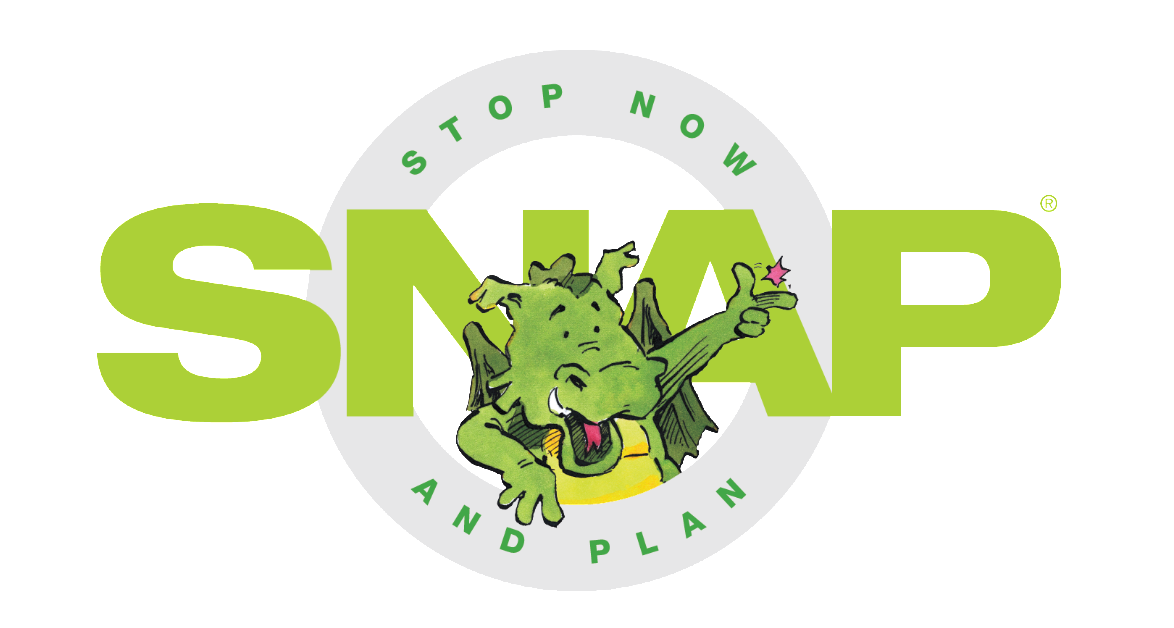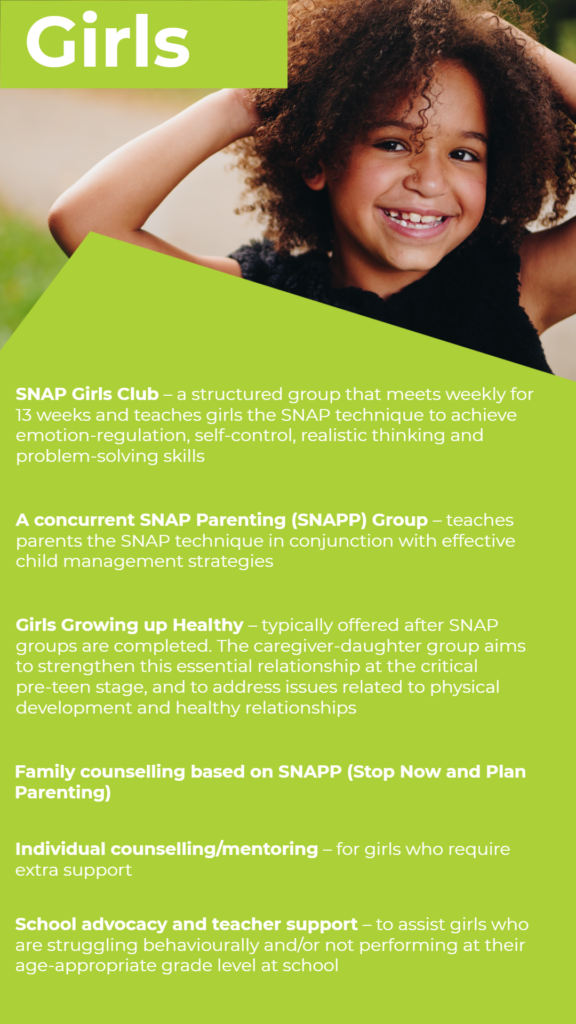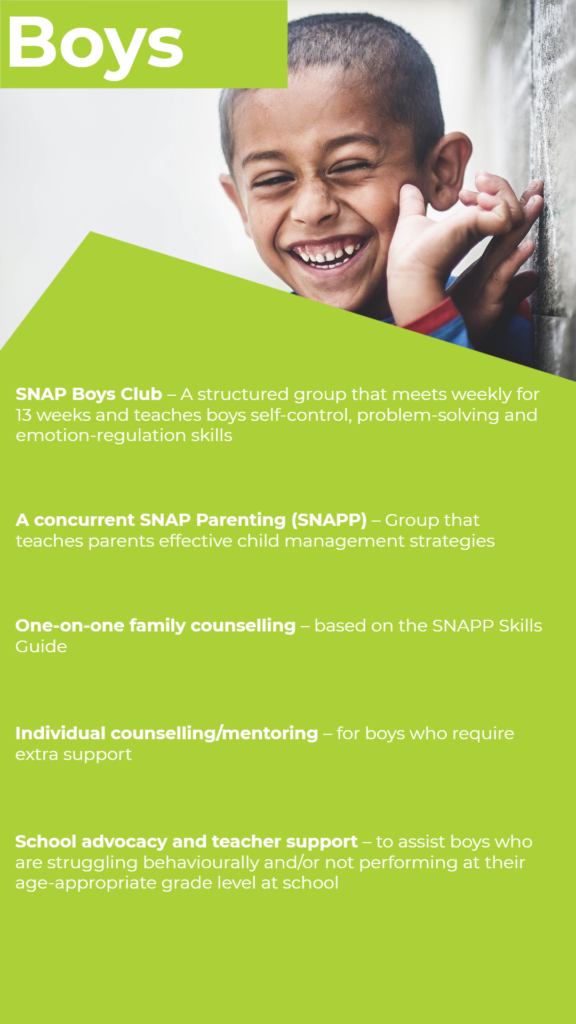We help children and youth make better choices “in the moment”.

What is SNAP®?
SNAP® is built on three decades of solid research, innovative program development, and stringent evaluation.
SNAP®, is an award-winning, evidence-based, gender sensitive program that is developed by Child Development Institute. A team of scientists and practitioners, including Kenneth Goldberg, Kathryn Levene, Leena Augimeri, Elizabeth Leggett, Camille Hannays and Dr. Debra Pepler develop the program.
CDI which is an accredited children’s mental health organization in Toronto, ON. Operating since 1985, as an intervention program for boys under 12 years in conflict with the law, the program has grown and evolved into an internationally recognized model for teaching children and their parents.
Some of the clinical milestones that SNAP has accomplished are as follows:
1982: Camp Wimodausis, the first Toronto-based specialized day camp for children ages 6 to 11, whose social and behaviour problems would otherwise prevent them from attending a summer day camp, launches.
1996: SNAP Girls Connection – now called SNAP Girls – the first-ever sustained, gender-specific program for behaviourally troubled girls and their families launches. We recognized a significant gap in programming and research to address the unique factors influencing girl aggression and created SNAP Girls to fill this gap.
1998: The Early Assessment Risk List for Boys (EARL-20B) launches. This comprehensive psychosocial risk assessment framework focuses specifically on young children in trouble with the law. The 20 questions in the manual assist practitioners in identifying risk factors associated with future antisocial behaviour in children.
2001: The Early Assessment Risk List for Girls (EARL-21G) launches. It is a comprehensive gender-specific psychosocial risk assessment tool focused on young girls (6-11years) with disruptive behavioural issues.
SNAP®, is an evidence based, cognitive behavioural therapy program that provides a framework for teaching children and their parents, effective emotional regulation, self-control and problem solving skills.
Our program utilizes both individual and group counselling for parents and their children (concurrently), once a week for a 13-week family education program.
To learn more, please watch this video.
Is your child is between the ages of 6 – 11 years old?
Left untreated, conduct disorders can have long-term, significant impacts on the child, their family and society. Poor lifespan outcomes include persistent criminality (approximately 60 per cent of incarcerated males have a history of conduct disorders), poor vocational and social functioning, mental illness, increased rates of hospitalization, family and parenting dysfunction, and substance abuse.
Typical presenting problems of conduct disorders/disruptive behaviour problems include:
· Difficult family relationships
· Physically aggressive behaviour
· Angry outbursts
· Verbally aggressive or defiant behaviour
· Lack of self-control and problem-solving skills
· Difficulty making and maintaining healthy relationships
· Stealing
· Bullying
· Vandalism
SNAP at Somali Center for Family Services
SNAP®, is culturally informed and is provided by professionals from the same community. Although families of all ethnicities and backgrounds are welcome, we are pleased to offer a culturally responsive program which takes into consideration all cultural, socioeconomic and language-based needs of our clients.
We take pride in ourselves in commitment to social justice, anti-racism, anti-discrimination practices such as anti-oppressive, strength-based approach to serving clients.



Join SNAP
Interested in joining?
Fill out the SNAP intake form to register.
SNAP Referral
Interested in referring someone?
Please complete referral form below and we’ll be in touch.
SNAP® has a proven track record for changing lives.
SNAP proven outcomes
- Increased emotion regulation, self-control, problem-solving skills, pro-social communication, executive functioning and social competency
- Decreased antisocial behaviour, rule breaking, depression, anxiety and police contact
- Enhanced ability to make better choices in peers
- Improved success at school, including a decrease in disciplinary issues
- Increased connection to positive community activities
- Development of effective child management strategies, positive support systems, coping abilities and communication skills
- Decreased parental distress and increased parental competency
- Development of positive pro-social values and conduct
Long-term outcomes (12+ months)
- Maintenance of post-group achievements
- Continued improvement in the parent’s ability to use effective child management strategies
- No involvement with the criminal justice system
- Delayed and less frequent trouble with the police/delayed entry into the youth justice system
- Continued improvement in the child’s executive functioning

















